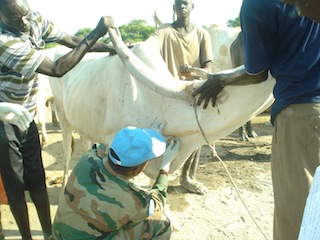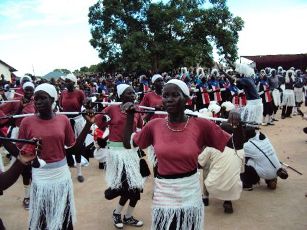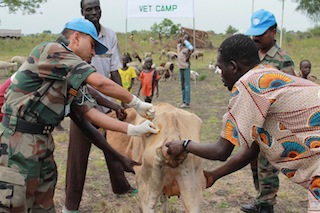Indian peacekeepers treat sick animals in Jonglei
January 16, 2013 (BOR) – Indian peacekeepers in Jonglei state are now actively involved in treating sick domestic animals in the state, UN officials said on Monday.

“We are doing many things in the areas in which we are deployed to win the hearts and minds of the people there,” said Mishra.
Many people in Jonglei state depend on animals for their livelihood, however, local veterinary services continue to remain scarce and costly.
The United Nations Mission in South Sudan (UNMISS) has been operating a veterinary hospital in Bor town since March 2012, providing livestock with veterinary treatments and distributing free medicines.

He says a total of 3,678 domestic animals have been treated since last November, including 2,910 head of cattle and 768 sheep. Veterinary assistance and distribution of free medicines has also been provided for goats at camps in Pibor county.
Mishra said the Indian army had provided training to a number of staff from Jonglei’s Ministry of Livestock and Fisheries covering clinical examinations and treatment procedures for small and large animals.
UNMISS established its operations in South Sudan last July after the country gained independence as part of international efforts to consolidate peace and security in the new nation.
The battalion of Indian soldiers began treating sick animals last year in order “to win the hearts and minds” and gain the acceptance of local people, Mishra said in December.

The team of doctors from UNMISS’s Indian battalion have treated goats, sheep and cattle from various diseases with free medicines, not found locally in South Sudan.
According to Mishra, his team has treated thousands of cattle, goats and sheep in Bor and Pibor among other counties.
Jonglei State has the highest level of East Coast Fever, a brown tick-borne disease that appeared in 2008.
According to an assessment made by veterinary professor Aggrey Ayuen Majok in 2009, Jonglei, South Sudan’s largest state, is home to 1.8 million cattle.
Hundreds of thousands of cattle died from the disease between 2008-2010, forcing some Dinka Bor Pastoralist to flee into neighbouring Central Equartoria State, crossing the White Nile River to Kaji-Kaji County earlier in 2011.
Over 70 heads of cattle are injected every day in Bor according to a local veterinary worker in Bor.
As well as being a vital for the livelihoods of many South Sudanese, cattle are often a source of conflict in the young nation, which is one of the poorest in the world.
Over the last two years a cycle of raids and counter raids between the Murle, Dinka Bor and Nuer tribes, around 2,000 people have been killed. A year ago the Luo Nuer launched a huge attack on Murle territory in Pibor County, displacing over 100,000 people.
(ST)
